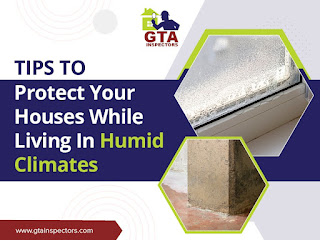Tips for protecting your house in humid climates
We say, “Purchasing a House!” There is a lot of excitement when we say “Purchasing a house!” To make the right choice, people go to great lengths to ensure they are making the right decision. The climatic conditions in the area or city where you want to settle are crucial.
You need to be extra careful if you’re in Dubai!
Dubai’s desert climate makes it difficult for both builders and residents to create a perfect nest. Due to its proximity to water, Dubai is subject to a lot of humidity. It’s not just the humidity that causes damage at these sites; the soil is also damp.
As property inspectors we are often asked by people to advise them on how to maintain the temperature of their home.
Nobody wants their home to feel like it’s a sauna.
All that heavy, moist air can cause a host of problems.
Problems can be mould growth, poor indoor air quality and wood rottings. They also provide a breeding ground for bacteria and are a concern for many people. What can be done to avoid or fix these problems?
The cooling and heating systems are the most important aspects of energy efficiency and consumption in a house. This energy is also affected by the humidity. This can cause damage to furniture, flooring, carpeting, and other household items.
GTA Inspectors has some suggestions that may help you.
1. You should keep a clear view out of your windows
It may sound crazy to open your windows on a hot day, but it is actually a good idea!
Are you able to do it?
Allowing air to circulate inside the house helps regulate it. The catalyst for increasing humidity levels is stagnant air. However, it can also be harmful to keep those shutters closed for too long. Don’t try to let the humid air out of your windows for too long.
2. You can improve your gardening skills:
Studies have shown that a green environment can lead to a clean environment. Installing a garden could work wonders for your house.
Why?
In our years of experience as a property snagging company, we found that houses with gardens are generally cooler and experience a sense of freshness in the surroundings. House plants help reduce humidity levels by extracting many nutrients from the air that help reduce moisture.
3. There are many options for flooring:
Carpets are a key holder of moisture. They retain a lot humidity and can cause an increase in temperature. Stone or tile flooring is a good choice if you live in humid areas.
4. You can also install a dehumidifier.
There are many dehumidifying products on the market that can help with humidity problems. There are many options available to choose from: high capacity, dampness protection, odour eliminators and others.
5. It might be possible to vent the stove and bathroom fans from outside of the house.
The best way to save your energy is to use exhaust fans in the bathroom and kitchen.
You can get a better solution by putting them in the attic. You could also try securing them outside of the house. This will allow for the release of humid air outside and create a cooler environment.
6. Insulating water pipes
Condensation can occur when the temperatures inside and outside of the pipes are different. Insulating the pipes in your home can reduce humidity problems. Insulating hot water pipes reduces heat loss from the water heater to the tap. This results in heating and using less water.
We hope you have found some basic home remedies that can be used to keep your home from becoming too humid. GTA Inspectors, the best home inspection company in Dubai, can help you control the temperature.
Remember that heat is not what you feel in your home; it’s humidity.


.png)

Comments
Post a Comment